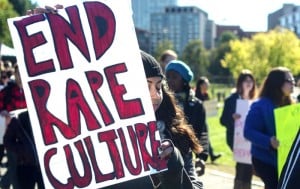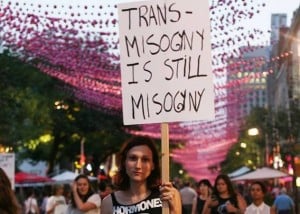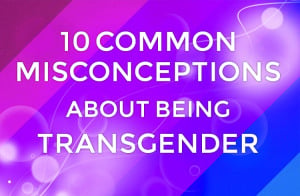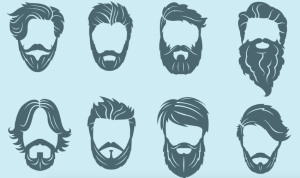(Content Warning: homophobic slurs)
Author’s Note: I’d like to preface this by saying that this is one trans person’s experience, and is not meant to speak for all trans people. I am a white, transmasculine, genderqueer kid, and that undoubtedly impacts my experience as trans. In the end, I made choices that not every trans person has the privilege of making. But I hope that, regardless of where you are in your journey, you can feel validated in your struggles by reading a little bit about mine.
With love and solidarity,
xx Sam Dylan Finch
My first packer was made out of a sock, and it sat in my dresser for weeks before I even contemplated wearing it.
I was 19.
I knew that if I gave in to my curiosity, any chance I had at being cisgender would be dissolved. That if I let myself dabble, there would be no going back. I thought if I held out, if I was patient, I could thwart this queer urge and be “normal.”
Then one night, while lying around in my bedroom after everyone had gone to sleep, I told myself, Maybe it’s like an itch that needs to be scratched, maybe if I do this thing once, maybe if I let myself wear it, that will be enough.
What a silly thing to tell myself.
What they don’t tell you about being transgender is that sometimes, the transphobe is you.
Denial
My hand traced around it, slowly and deliberately, but never quite touching it. For that first night, after I put it into place, I wouldn’t let myself actually touch it, look at it, or acknowledge that that part was there.
Instead, I stared at the wall in front of me and whispered under my breath, “Faggot. Faggot. Faggot. Faggot.”
I thought that if I punished myself, I wouldn’t want to be this way anymore. If I demonized my transness – if I were cruel enough and I was patient – I could chase it away and it would never come back.
What they don’t tell you about being transgender is that, sometimes, it doesn’t begin as a glorious epiphany, a relief, a moment of clarity.
For me, it began in the darkest part of the closet, not quite believing that it was possible to be happy and to be trans.
That night, I didn’t sleep. I had worn a packer. And there was a very real part of me, underneath the guilt and disgust, that enjoyed it.
That night, I had woken up a sleeping beast.
Over the course of the next few months, I could feel my gender kicking and screaming whenever I looked in the mirror. It made demands and held me hostage: my gender wanted shorter hair, and my gender wanted me to bind my breasts, and my gender wanted me to wear the packer again.
I dissociated from it because I didn’t want to believe that the urge to transition was my own. It was a circus of denial, of finding new ways to invalidate my queerness or remove myself from it.
“I’m… I’m just confused.”
“It’s an androgynous phase. It’s fine.”
The packer’s presence in the top left drawer of my dresser was like a siren song, and despite my disgust, I kept finding myself going back to it.
It was the sweetest kind of torture, where you both desperately want and intensely despise something – a contradiction that I found myself repeating every night.
Guilt
The denial waxed and waned until it gave way to guilt.
As I crafted makeshift binders, cut my hair, and stole shirts from my older brother, the person who stared back at me in the mirror started to resemble my father in ways that scared me.
I thought about what he might think, now that this person he called his daughter looked more like his son, like the spitting image of him in his reckless teenage years.
I thought about what the people I loved might think if they knew what I was doing late at night, if they knew I was—well, in their words—a “cross-dresser.”
I thought back to the time when the world stood still, when my worst fear was confirmed, when I knew my parents couldn’t accept me as trans. I had made a careless joke, a really innocent joke – I was asking for seconds at dinner, and I called myself a “growing lad.”
I remembered my father dropping his silverware, his face turning bright red.
My mother’s voice, “Excuse me?”
I told them it was a joke. I told them it was harmless. I back-pedaled as hard and as fast as I could.
My father, standing up now, looked me straight in the eye and said, “You are not a boy. You will never be a boy. Do you understand? You will never, ever be a boy.”
Yet, here in front of the mirror, I was all boy, every bit of me.
And when I imagined their disappointment, my body began to tremble. I pulled my shoulders back, puffed out my chest, and tried to appear larger than I actually was – the way that you’re supposed to take up as much space as possible when confronted with a bear or a lion or a monster.
Those days – 19 and under my parents’ roof – I was so, so small.
Those days, the only words I knew how to say were, “I’m sorry, I’m sorry, I’m sorry.”
They never tell you that being transgender can sometimes feel like a run-on string of apologies – I’m sorry for being here, I’m sorry for being this way, I’m sorry for disappointing you, I’m sorry for your expectations, and I’m sorry for mine.
And I’m sorry, Dad, but you’re wrong.
Negotiation
When my tongue grew tired of apologies, and my heart grew tired of pretending, I tried to negotiate – I tried to find ways of being trans at a more convenient time, in a less committal way.
After the denial and after the guilt, I tried bargaining – because what they don’t tell you about being trans is that it’s all the stages of grief, sometimes all at once. You’re losing who you were told to be to become what you really are, and sometimes that hurts – they won’t tell you this, but sometimes it really hurts.
Sam, I said, Sam, if you just pack at night, can that be enough? (No.)
Sam, I’ll buy you this binder, but you have to promise me you’ll only wear it when you’re out with friends. (A promise I won’t keep.)
Sam, we can buy the nice packer, the one that’s like a real dick, but you can only wear it alone, no one can see it, no one can know. (This didn’t last long.)
Sam, you can try out new pronouns, but please don’t get attached. (I got attached.)
Sam, you can be transgender, but it can only be our secret. It has to be a secret. (Does it?)
And when you keep your queerness a secret, every “she” and every “her” and every “daughter” is a reminder that you are only the sum of the lies that you tell, and that you’ve all but disappeared.
Depression
There is a kind of depression I never knew until I clipped my own wings because I was afraid of being seen.
What they don’t tell you about being trans is that sometimes we are our own destroyers, we are our own killers, we are our own mutilators – sometimes we cause ourselves more pain than anybody else, because from the time that we were young we were told, sometimes quietly and sometimes loudly, that we weren’t meant to exist this way.
At first, I only knew how to hurt because I thought that people like me were supposed to hurt.
When you exist in a society that tells you that who you are is wrong, the violence enacted on you is a song and dance you know by heart, and at first, it feels perfectly natural to hate yourself because you were groomed for this stage, for this act, for this spectacle.
More times than I care to admit, I said to myself, “You’re disgusting, you’re wrong, you’re fucked up.” And I could hear the applause rattling in my brain, because while I knew that this was a terrible thing to say, it was the only way I knew how to communicate with myself.
But it’s tiring to keep fighting someone who won’t fight back; it’s tiring to keep kicking someone while they’re already down. I sucker punched my own reflection so many times but my face never cracked.
Could it be any worse than this – bruised knuckles and hoarse screams – if I just stopped fighting? If I laid down my arms, if I embraced the truth?
So I did.
Acceptance
When I was 21, I made a plan. I started gathering up my most prized possessions and giving them to friends.
Slowly but surely, I emptied out my room. My violin, my laptop, my favorite volumes of poetry, my teapot collection, my stuffed animals.
I told my friends that I’d be back, that they should keep those things safe.
After a week of quietly moving my things, I told my parents that I was moving away. My mother cried, not understanding why I would go. My father’s eyes glazed over in disbelief.
I watched as they moved through denial (you can’t leave), guilt (was it something I did?), negotiation (we’ll give you a later curfew), depression (empty stares and trembling hands), and finally, handing me a box full of towels and toiletries and quietly saying, “If you need anything, just call us.”
I wanted to tell them that I was transgender right then, tell them that I couldn’t be who I was meant to be until I had the space to figure out who exactly that was.
I wanted to tell them about the chest binder, the overwhelming joy I felt when my breasts disappeared under my shirt.
I wanted to tell them that it wasn’t their fault, that I just couldn’t bear to see the disappointment in their eyes as I transitioned.
I wanted to tell them that I was sorry for being a coward, for running away instead of telling them the truth.
I wanted to remind them of that day they told me I could never be a boy – that they were right, in a sense, because it wasn’t safe to be one in that house, in those walls.
But I didn’t give them that explanation. I didn’t come out, not then, and I left them behind. Because I wasn’t ready yet.
Because I needed the words to explain who I was before I could ever explain it to them. And I needed to love myself first, before I could teach others how I wanted to be loved.
The binder, the androgynous clothes, and yes, the packer were all shoved into a duffel bag, slung over my shoulder, as I walked out of my old life.
And even as I said my goodbyes, I didn’t look behind me.
[do_widget id=”text-101″]
Sam Dylan Finch a Contributing Writer for Everyday Feminism. He is queer writer, activist, and educator based in the San Francisco Bay Area. In addition to his work at Everyday Feminism, he is also the founder of Let’s Queer Things Up!, his hella queer and very awesome blog. You can learn more about him here and read his articles here. Follow him on Twitter @samdylanfinch.
Search our 3000+ articles!
Read our articles about:
Our online racial justice training
Used by hundreds of universities, non-profits, and businesses.
Click to learn more
Most Read Articles
- « Previous
- 1
- …
- 30
- 31
- 32




















